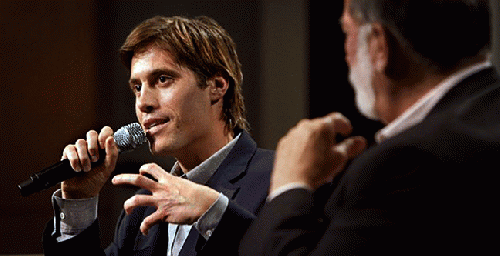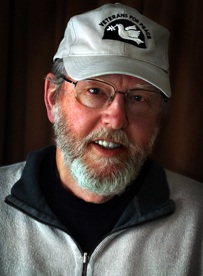Back in June 2011, James Foley gave an hour-long interview* to an auditorium of students from the Medill School of Journalism at Northwestern University in Evanston, Illinois, where he had graduated three years earlier with a Master's degree in journalism. It was 15 days after he had been released from 45 rough days of captivity in Libya. He was a handsome young hero returning to his alma-mater.
In a recent item in The New Yorker, Mark Singer quotes Foley that his Libyan captivity was "a cautionary tale." He makes it clear to the journalism students at Medill that the business of covering wars was pretty new to him when he was snatched in Libya in early 2011.

James Foley at Medill School of Journalism in June 2011, with Timothy McNulty
(Image by unknown) Details DMCA
In the interview, he says one thing the US military learned in Vietnam was the need to control journalists. So they came up with the "embed" idea. With a shiny Masters degree in hand, he got a job embedded with a US National Guard unit in Iraq.
"You start to bond with these guys," he says. "You wonder about your objectivity sometimes -- especially with US soldiers." He fully appreciates the history and the thinking behind the military's embed program, which relies on a reporter bonding with the soldiers he is covering. These same soldiers are protecting his life. He seems to understand the pressures this relationship puts on his ability as a journalist to be "objective." By now, everyone in the journalism business knows there is no such thing as objectivity. I have a Masters Degree in Journalism from Temple University and I first learned the same lesson about objectivity in coursework there.
Foley next reveals the key to why many war journalists are so driven to do what they do.
"When you see something violent it doesn't always repel you. It can draw you close," he says. Shots of individual students in the audience reveal young faces in rapt attention. "Feeling that you survived has a strange sort of force."
When he moved on to the Libyan assault, he was embedded with a rebel unit. He tells how he was pulled into going forward by some of the older, more experienced war journalists like Anton Hammerl, a South Africans photographer associated with "the bang-bang club," legendary shooters during the days of bloody street fighting between South African white government troops and black freedom-fighting militias. The group also included Clare Morgana Gillis and Manu Brado.
Suddenly they find themselves in the wrong place at the wrong time. They are captured by pro-Ghadaffi troops. Hammerl is shot and bleeds to death. He and a woman journalist are wounded and beaten. There is no question this was a harrowing time for Foley, an athletic man in his late 30s at the time. During the interview he says he knew being captured was hard for his family; he thinks how really hard it would be if he were to be killed by his captors. He thinks about not doing it anymore, for his family's sake.
When the fighting in Syria broke out, the lure pulled him into that increasingly confusing and brutal conflict. "Conflict zones can be covered safely," he tells McNulty. "But you have to be very experienced. You have to be very, very careful."
The history is clear: Backed up by high-level lies, post-9/11 fears and a raft full of delusion, our American military was ordered in 2003 to unleash shock and awe bombing and, a bit later, a ruthless and effective assassination program to dis-empower Sunnis in Iraq's western Anbar province. The question that haunts James Foley's horrific end as a video thumb-in-the-eye to the Americans who did this is: Using his own categories, was he experienced and careful enough? Or was he a little too eager to be at the center of the action?
Granted this is a provocative line of questioning based, in my case, on a veteran antiwar point-of-view and two trips through Anbar Province during the Bush war. It all leads to the ultimately troubling question: Was James Foley actually a victim of the Bush Administration's stupid decision to invade Iraq and turn the keys to the country over to the Shiites, fueling a psychopathic cycle of revenge?
American leaders and blind citizen-patriots don't like this line of questioning. They prefer to conveniently forget a major debacle and to pursue with new vigor the cycle of vengeance. Instead of self-examination they choose to utilize easy emotional scapegoats, easily demonizable monsters that, in this case, they had a lot to do with creating in the first place.
When I was in Iraq briefly as a cameraman in January 2004, one night my colleague and I thought we were being kidnapped. It turned out we were wrong and it was a bizarre confusion of language and circumstance. We had basically scared ourselves. I made a big scene with an SUV driver and, in the end, ate crow in embarrassment. Being two men way over their heads in such a war zone had a lot to do with the confusion. By the grace of some deity -- I'll leave which to the theologians -- we ended up with our heads still on our shoulders.
I mention this only to make the point had we actually been kidnapped by furious anti-American insurgents -- something that would no doubt have been an excruciating and terrifying experience -- and had we been killed in public videos, I am certain neither of us would have wanted any kind of after-the-fact revenge to be taken in our name. Self-defense actions or being saved despite our stupidity is another matter. This peace activist wants to live just as badly as the next person.
(Note: You can view every article as one long page if you sign up as an Advocate Member, or higher).




